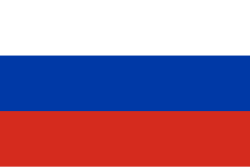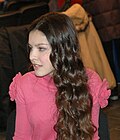| Russia in the Junior Eurovision Song Contest | |
|---|---|
| Junior Eurovision Song Contest | |
 | |
| Participating broadcaster | RTR |
| Participation summary | |
| Appearances | 17 |
| First appearance | 2005 |
| Last appearance | 2021 |
| Highest placement | 1st: 2006, 2017 |
| External links | |
| Russia's page at JuniorEurovision.tv | |
| Russia in the Junior Eurovision Song Contest 2021 | |
Russia was represented at the Junior Eurovision Song Contest for the first time in 2005. The Russian participating broadcaster in the contest was All-Russia State Television and Radio Broadcasting Company (RTR). Its first win came in 2006, with "Vesenniy jazz" by Tolmachevy Twins. Its second win came in 2017, with "Wings" by Polina Bogusevich. Its worst result to date has been achieved with the song "A Time for Us" by Tanya Mezhentseva and Denberel Oorzhak in 2019 where it placed 13th.
Contents
RTR has represented Russia at the Junior Eurovision Song Contest. The broadcaster has selected Ekaterina Ryabova to represent Russia at the Junior Eurovision Song Contest 2009 in Kyiv with the song "Malenkiy prints". [1] Ekaterina Ryabova represented Russia once again in 2011 with the song "Kak Romeo i Dzhulyetta". She was also the first returning artist in the history of the Junior Eurovision.
Russia had initially confirmed their participation in the 2022 contest, [2] however on 26 February 2022, the Russian broadcasters VGTRK and Channel One Russia withdrew their EBU membership after the country was excluded from participating in the regular Eurovision Song Contest due to the Russian invasion of Ukraine, thus being excluded from Junior Eurovision in 2022 and beyond. [3]









